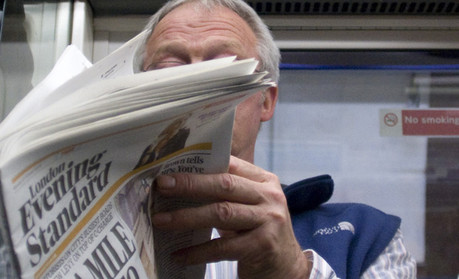
Evening Standard reader. Fabio Venni on Flickr
Credit: Fabio VenniThe Metropolitan police has accused the Evening Standard of a "deliberate campaign" to undermine the investigation into payments made to officers by the News of the World.
A statement released by the Met this afternoon says the Evening Standard article "Queen's police sold her details to the News of the World" represents a "deliberate campaign to undermine the investigation into the alleged payments by corrupt journalists to corrupt police officers and divert attention from elsewhere".
The Met statement suggests that News International may be the target of its ire, claiming that during meetings with the publisher "it was agreed by all parties that this information would be kept confidential so that we could pursue various lines of inquiry, identify those responsible without alerting them and secure best evidence".
The statement goes on to say that the Met is "extremely concerned and disappointed that the continuous release of selected information -– that is only known by a small number of people – could have a significant impact on the corruption investigation".
The Standard article, by home affairs editor Martin Bentham, alleges that details about the Queen and close aides were sold to the News of the World by corrupt royal protection officers.
The information reportedly included phone numbers and information about the movements of the Queen and Prince Philip.
The article also alleges the payments were first uncovered by News International in 2007, but not passed to the Met until last month.
Former News of the World editor Andy Coulson, who resigned from the title in 2007 after royal reporter Clive Goodman and private investigator Glenn Mulcaire were jailed for phone hacking, was himself arrested on Friday in connection with the scandal.
Coulson, who went on to become David Cameron's director of communications, has consistently denied having any knowledge of either phone hacking or payments being made to police officers. He testified during the trial of Tommy Sheridan in 2010, that he had no knowledge of either practice taking place under his editorship.
The Met last week referred its internal investigation into payments being accepted by officers to the Independent Press Complaints Commission following "significant public and political concern".
Met police commissioner Sir Paul Stephenson acknowledged that payments had been made to officers, but denied that any senior officers were involved.
Revelations about phone hacking and payments to police has brought News Corporation, which owns News International, under increasing pressure over its bid to take full control of BSkyB.
Secretary of state Jeremy Hunt wrote to Ofcom and the Office of Fair trading today to ask for further 'advice' on the bid, and Nick Clegg has joined Ed Miliband in calling for the bid to be delayed.
Free daily newsletter
If you like our news and feature articles, you can sign up to receive our free daily (Mon-Fri) email newsletter (mobile friendly).
Related articles
- How Dow Jones is tackling AI copyright challenges
- Tristan Kirk, court correspondent, The Evening Standard, on virtual attendance at UK courts
- Tips to handle sensitive stories when working on your own
- Abbianca Makoni, independent producer, on documenting UK women gangs
- Publishers are experimenting with smart speakers, addressing concerns around monetisation and discoverability











